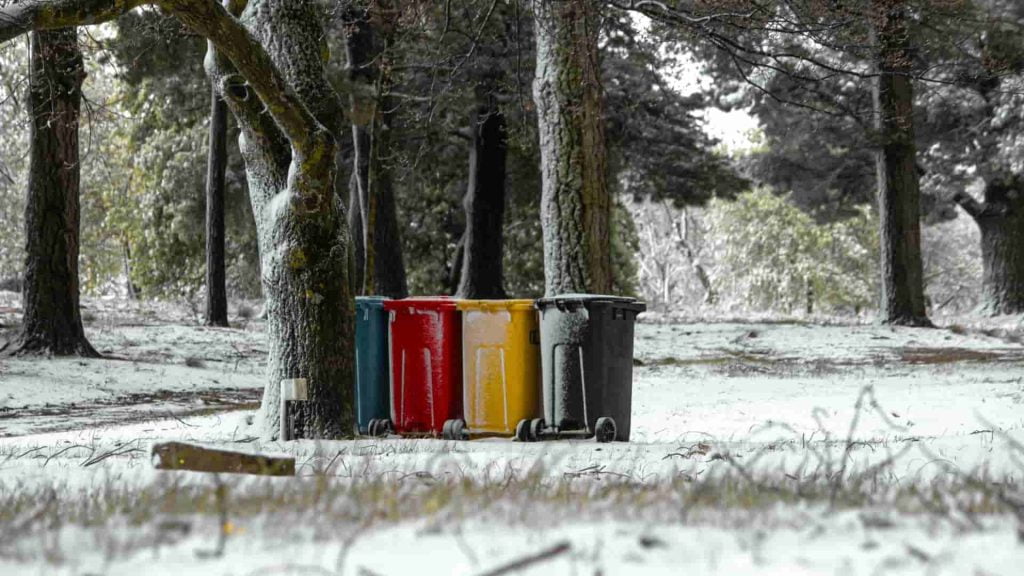While the world sips oat milk lattes and pats themselves on the back for recycling that plastic wrapper, Germany is quietly crushing it on a whole other level. From renewable energy infrastructure to bike-powered commutes, Germany is setting the standard for eco-friendly living. Let us dive into the top 15 proofs that Germany is ahead of the pack in sustainable living.
Waste Management

Germans are masters of recycling. They sort over 65% of their household waste. That’s way higher than the EU average – thanks to their awesome curbside programs, deposit return schemes, and public education campaigns. The Pfand system (which involves paying a deposit for bottles and cans and getting them back upon returning) is a rigorous ongoing practice. This system has led to an incredible recycling rate in Germany, where over 97% of plastic and glass bottles are recycled.
While the country is known for its efficient waste management system and recycling practices, it still faces challenges in reducing overall waste generation. As of 2021, Germany produced over 400 kilograms of municipal waste per capita, higher than the European Union average. Despite having one of the most advanced recycling systems globally, the country still grapples with properly disposing of electronic waste (e-waste).
Water Management
Germans are champions when it comes to conserving water. A report states, “Nearly 60% of Germans say they are trying to conserve water at home due to its impact on nature.” The country aims to maximize water efficiency in the industrial, agricultural, and urban sectors. Germany has one of the world’s best plumbing systems with leak detection initiatives and greywater recycling. And rainwater harvesting, sustainable drainage systems are other common technologies.
While Germany’s rain harvesting system is a laudable sustainable practice, it has downsides. One significant challenge lies in the initial installation costs. The huge cost discourages some individuals and businesses from adopting this eco-friendly solution. Further, the efficiency of rainwater collection depends on weather patterns. This means if there’s not much rain, there’s not much water. And maintenance issues can be tricky.
Food Management
Germans hate wasting food. An article by the National Institute of Health stated that “nearly 50% of food waste is rated as avoidable by consumers themselves.” With supermarkets offering “best before” items for discounts, apps connecting restaurants with hungry patrons to avoid leftovers, and campaigns such as “too good for the bin,” they are experts at reducing food waste.
Sustainable Fashion
Unlike the others, sustainable fashion isn’t just a fad in Germany, it is a movement. As of 2023, 49% of Germans said sustainability plays a significant role in their fashion choices. Increasingly, there are second-hand shops, vintage clothing is trending, and brands are adopting eco-friendly materials and ethical production methods.
Green Hotels
Heard of Green Hotels? You’ll find many across Germany. These hotels have pledged to reduce their environmental impact through more sustainable practices. For example, the “Atlantic Hotel Sail City” in Bremerhaven has already cut CO2 emissions by 38 percent since 2013. The hotel boasts rooftop beehives that produce honey for the fully organic breakfast menu sourced from local farms.
Eco-Friendly Urban Planning

German cities are at the forefront of eco-friendly urban planning (this includes green spaces, parks, and urban forests). Cities like Freiburg and Hamburg are prime examples. Freiburg is known for its sustainable city planning and has been called Germany’s “eco-capital”. The city of Hamburg has set ambitious goals to reduce CO2 emissions and increase green spaces, with the goal of covering 40% of the city with green spaces by 2030.
However, urban expansion is encroaching on natural habitats and reducing recreational green spaces. In 2020, over 77% of Germany’s population lived in urban areas, a trend that is expected to continue. This decline in green spaces has implications for biodiversity, air quality, and overall well-being.
Also Read: 5 Amazing Ways in Which Berlin Practices Sustainability and Eco-Friendly Living
Agricultural Practices
Agriculture is a significant contributor to Germany’s economy. Over 10% of the land is dedicated to organic farming, with a target set for a 30% share by 2030. This means more fresh, pesticide-free food and happier soil worms. However, it comes with downsides when it comes to sustainability. Intensive farming practices, including the use of pesticides and fertilizers, have raised concerns about soil degradation and water pollution. According to a report by the European Environment Agency, agricultural activities in Germany were responsible for over 70% of nitrate pollution in freshwater.
Sustainable Transportation

Germany loves two wheels. The country has one of the best cycling infrastructures in the world, with over 70,000 kilometers of dedicated bike paths. Germany’s large investments in sustainable transportation, including public transport networks (buses, trams, and trains), significantly contribute to sustainability. And the cool part is that many German cities offer incentives just for using public transportation. This autobahn country is determined to have seven to fifteen million EVs on the roads by 2030.
While the country has invested heavily in public transportation and boasts an extensive rail network, the reliance on private vehicles remains a stumbling block. In 2021, over 46 million passenger cars were registered in Germany, outnumbering the population. This high number of cars contributes to traffic congestion, air pollution, and increased carbon emissions. Despite efforts to promote electric vehicles (EVs), their adoption rate has been slower than anticipated. As of 2022, EVs constitute only around 1.5% of the total number of registered vehicles in Germany.
Reforestation Initiatives
Germany takes its ecological balance and combating climate change seriously. The country has had large-scale reforestation initiatives to enhance biodiversity, prevent soil erosion, and absorb CO2. Germany has witnessed an increase in its forest areas since the 1990s. Besides planting trees, these initiatives also include managing and protecting existing forest areas, ensuring they are resilient and adaptable to climate change.
Vehicle Emission Standards
Germany is renowned for its highly strict vehicle emission standards (euro emission standards – one of the strictest in the world). For instance, the latest Euro 6 standard sets very low limits for nitrogen oxides (NOx) and particulate matter in diesel engines. So, the German automakers are leading the way with cleaner, more efficient engine technologies. And they are also advocating for the shift towards electric vehicles, which further reduces the transportation effect on the environment.
Bans on Toxins

Germany, for years, has been proactive in banning or restricting harmful chemicals and plastics. Among them are stringent regulations regarding the use of pesticides and fertilizers in agriculture and a focus on reducing single-use plastics. In fact, Germany was one of the first countries to introduce a nationwide ban on lightweight plastic carrier bags. The country also has strong policies on chemical safety and is actively involved in the European Union’s REACH regulation. Additionally, the government announced its intention to stop the export of banned pesticides.
Government Initiatives
Germany’s government policies embrace various initiatives, from renewable energy to energy efficiency to sustainable agriculture. Among other things, the Renewable Energy Sources Act (Erneuerbare-Energien-Gesetz, EEG) has made it easier to use renewable energy in Germany. In addition, they also encourage energy-efficient building renovations and eco-friendly technology use. Aside from that, Germany’s National Sustainable Development Strategy (NSDS) prioritizes sustainable economic practices, climate protection, and conservation of natural resources.




